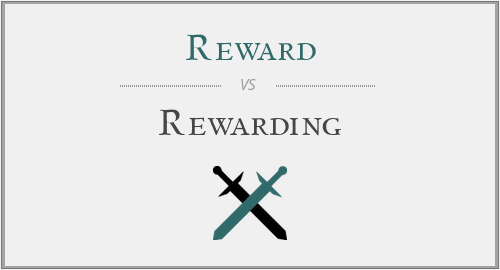The pair of words "reward" and "rewarding" can be very tricky. Especially when it's not clear for you which one is the verb and which one is the noun - or even an adjective? Let's help to get your thoughts in order, shall we?
Reward vs. Rewarding
Regarding their meaning, in lexical terms, "reward" and "rewarding" are part of the same lexical family. This explains why their meanings are very close to one another. Both words refer to some kind of prize, satisfaction or appreciation - whether it's material or intangible - gained after doing some good or hard work. Regarding their use in sentences and phrases however, is where the similarity ends.
"Reward" and "rewarding" are completely different words from a grammatical perspective, each of them representing another part of speech. Below you can better understand what we're referring to.
When do we use "reward"?
"Reward" can be used either as a verb or as a noun. As verb, the word refers to the action of offering a reward, a prize, to someone. As noun, it can either define a good thing (object/diploma/money/verbal appreciation etc.), a good experience, achieved after hard, excellent work, or as money given by police to someone who provides information about a crime.
Check out the sentences below so you see the correct context where "reward" can be used as noun or verb:
Example 1: I would like to reward you for all your hard work within our company! - "reward" is used as a verb defining the action of offering someone a remuneration/prize for their hard work.

Example 2: Winning the contest brought an amazing reward to the best participant. - "reward" is here used as noun, defining the object/prize achieved by the winner of a contest.
Example 3: There will be a reward for whoever provides useful information about the crime. - as a noun, "reward" can also be used to define the money given by police to one who provides information regarding a crime.
When do we use "rewarding"?
"Rewarding" is much simpler to understand and remember than "reward", as the former doesn't carry a range of grammatical roles as the latter. "Rewarding" can only be used as an adjective. And it describes the feeling of satisfaction gained by one after doing something very well. Here's an example to get a better idea of how to use "rewarding" correctly in a sentence:
Example: Helping other people is one of the most rewarding feelings one can experience. - "rewarding" can only be used as an adjective and it means feeling satisfaction for doing good or worthy things.
Conclusion
Here's a trick so you easily remember how to correctly distinguish "reward" from "rewarding": You can often see words ending in "-ing" turn from nouns into adjectives. Just like it happens for "interesting" or "challenging". Just remember that "rewarding" does the same: it is always the adjective formed from the noun/verb "reward", plus the "-ing" ending.
Once you keep this in mind, it's easy to remember the rest of the explanation. "Reward" is only used as a noun or verb, whereas "rewarding" is only ever an adjective.








Have a discussion about this article with the community:
Report Comment
We're doing our best to make sure our content is useful, accurate and safe.
If by any chance you spot an inappropriate comment while navigating through our website please use this form to let us know, and we'll take care of it shortly.
Attachment
You need to be logged in to favorite.
Log In